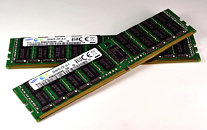- Joined
- Dec 6, 2011
- Messages
- 4,784 (0.98/day)
- Location
- Still on the East Side
Samsung Electronics Co., Ltd., the world leader in advanced memory technology, today announced that it is mass producing the most advanced DDR4 memory, for enterprise servers in next-generation data centers.
With the introduction of these high-performance, high-density DDR4 modules, Samsung can better support the need for advanced DDR4 in rapidly expanding, large-scale data centers and other enterprise server applications.

Early market availability of the 4-gigabit (Gb) DDR4 devices, which use 20 nanometer (nm)-class process technology, will facilitate demand for 16-gigabyte (GB) and 32 GB memory modules. This compares to conventional DRAM of which 8 GB modules using a 30 nm-class process technology are still commonplace.
"The adoption of ultra-high-speed DDR4 in next-generation server systems this year will initiate a push toward advanced premium memory across the enterprise," said Young-Hyun Jun, executive vice president, memory sales & marketing, Samsung Electronics. "After providing cutting-edge performance with our timely supply of 16 GB DDR3 earlier this year, we are continuing to extend the premium server market in 2013 and will now focus on higher density and added performance with 32 GB DDR4, and contribute to even greater growth of the green IT market in 2014."
In next-generation enterprise servers, the use of higher speed DRAM raises system level performance and lowers overall power consumption significantly. By adopting DDR4 memory technology early, OEMs can minimize operational costs and maximize performance to provide more favorable returns on investments.
Production of Samsung's 20 nm-class 4 Gb DDR4 follows the introduction of 50 nm-class 2 Gb DDR3 in 2008, culminating in a full-fledged transition to DDR4 for large-scale data centers and other enterprise applications in just five years. The 4 Gb-based DDR4 has the fastest DRAM data transmission rate of 2,667 megabits per second - a 1.25-fold increase over 20 nm-class DDR3, while lowering power consumption by more than 30 percent.
Based on Samsung's 20 nm-class DRAM, the world's highest performing and smallest 4 Gb DRAM chip, the company has now developed the industry's largest lineup of products tailored to applications from servers to mobile devices. This will provide global customers with the widest range of highly advanced low-power, high-performance green memory solutions.
Samsung remains committed to advancing the development of next-generation green memory devices and solutions in IT markets. With innovative developmental approaches directed at systems, solutions and software (the three S's), the company will continue to reinforce its green memory strategy and maximize the creation of shared value for its customers, while facilitating further expansion of the green IT marketplace.
View at TechPowerUp Main Site
With the introduction of these high-performance, high-density DDR4 modules, Samsung can better support the need for advanced DDR4 in rapidly expanding, large-scale data centers and other enterprise server applications.

Early market availability of the 4-gigabit (Gb) DDR4 devices, which use 20 nanometer (nm)-class process technology, will facilitate demand for 16-gigabyte (GB) and 32 GB memory modules. This compares to conventional DRAM of which 8 GB modules using a 30 nm-class process technology are still commonplace.
"The adoption of ultra-high-speed DDR4 in next-generation server systems this year will initiate a push toward advanced premium memory across the enterprise," said Young-Hyun Jun, executive vice president, memory sales & marketing, Samsung Electronics. "After providing cutting-edge performance with our timely supply of 16 GB DDR3 earlier this year, we are continuing to extend the premium server market in 2013 and will now focus on higher density and added performance with 32 GB DDR4, and contribute to even greater growth of the green IT market in 2014."
In next-generation enterprise servers, the use of higher speed DRAM raises system level performance and lowers overall power consumption significantly. By adopting DDR4 memory technology early, OEMs can minimize operational costs and maximize performance to provide more favorable returns on investments.
Production of Samsung's 20 nm-class 4 Gb DDR4 follows the introduction of 50 nm-class 2 Gb DDR3 in 2008, culminating in a full-fledged transition to DDR4 for large-scale data centers and other enterprise applications in just five years. The 4 Gb-based DDR4 has the fastest DRAM data transmission rate of 2,667 megabits per second - a 1.25-fold increase over 20 nm-class DDR3, while lowering power consumption by more than 30 percent.
Based on Samsung's 20 nm-class DRAM, the world's highest performing and smallest 4 Gb DRAM chip, the company has now developed the industry's largest lineup of products tailored to applications from servers to mobile devices. This will provide global customers with the widest range of highly advanced low-power, high-performance green memory solutions.
Samsung remains committed to advancing the development of next-generation green memory devices and solutions in IT markets. With innovative developmental approaches directed at systems, solutions and software (the three S's), the company will continue to reinforce its green memory strategy and maximize the creation of shared value for its customers, while facilitating further expansion of the green IT marketplace.
View at TechPowerUp Main Site














